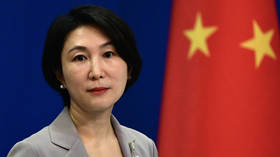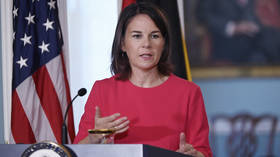China responds to German FM’s ‘dictator’ jibe

Beijing has “made serious inquiries” to Berlin over comments made by the country’s foreign minister, Annalena Baerbock, the Chinese Foreign Ministry said on Monday, after the top diplomat referred to Chinese President Xi Jinping as a “dictator” last week.
China is “extremely dissatisfied” with these remarks, the foreign ministry’s spokesperson, Mao Ning, told a regular news briefing. Mao believes the “absurd” comments “violate China’s political dignity” and are tantamount to an “open political provocation.”
The German Foreign Minister made her remarks in an interview with Fox News released last Thursday. When asked about her take on the ongoing conflict between Kiev and Moscow, Baerbock stated that Russian President Vladimir Putin should not be allowed to win since it would embolden “other dictators in the world” like “Xi, the Chinese president.”
In July, Germany adopted its first-ever strategy on China, which involved reducing its economic reliance on its essentially largest trade partner, which Berlin branded a “rival.” The 40-page document also said that “de-risking” in relations with China was urgently needed.
Bilateral trade between China and Germany reached a record €300 billion ($337 billion) last year. The July paper described Beijing as “simultaneously a partner, competitor, and systemic rival.”
Baerbock herself has taken a rather hardline stance on China. In August, she said that Beijing posed a challenge to the “fundamentals of how we live together in this world.” In April, she also described some parts of her trip to China as “more than shocking,” but did not provide any details. The foreign minister also insisted that Berlin should “not be naïve” and should avoid repeating mistakes it had apparently made in its relations with Russia.
Amid the conflict between Russia and Ukraine, Germany has been criticized for its “change through trade” policy towards Moscow, which is largely associated with former chancellor Angela Merkel. Under this policy, Russia was meant to become closer to the West through economic ties. Merkel herself has denied that this was her goal, adding that she merely sought to build ties with “the second most powerful nuclear-armed [nation] in the world.”
Baerbock has not been the only one to call Xi a “dictator.” US President Joe Biden did so in June, just a day after US State Secretary Antony Blinken finished his visit to China, which was aimed at easing tensions between the two nations.













